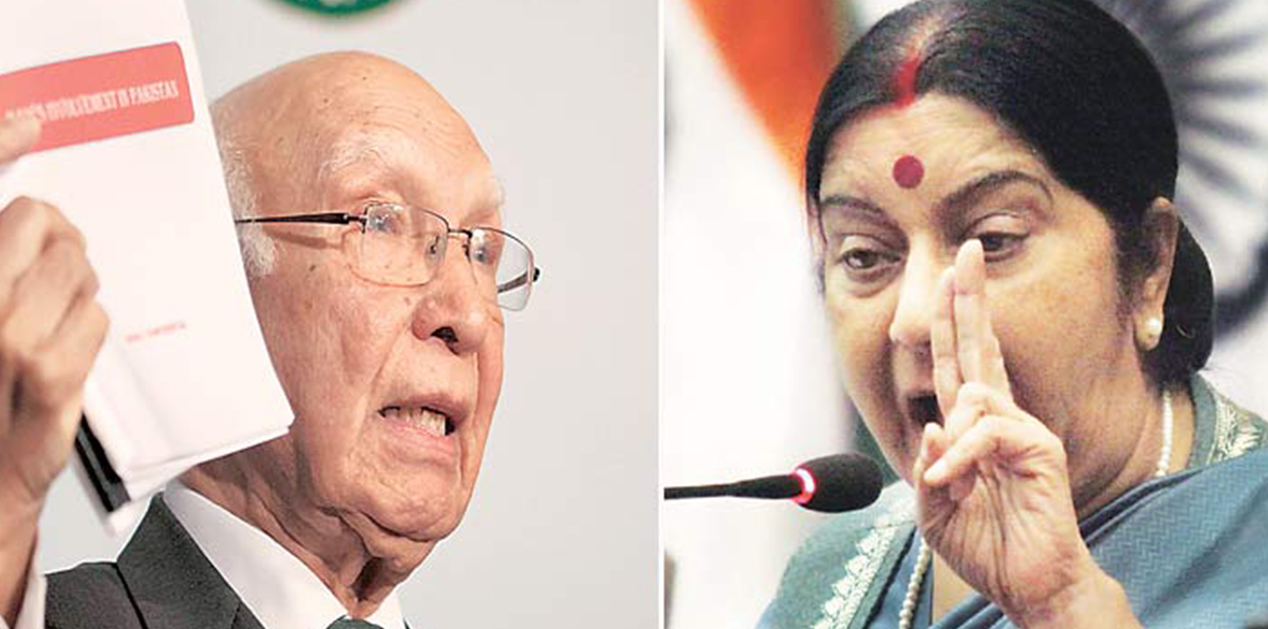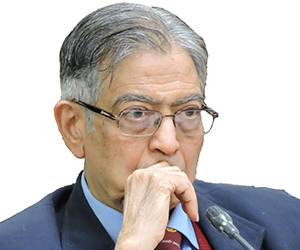The developments of the last few weeks, culminating in the highly successful surgical strikes conducted by the Indian Army across the LoC in the wee hours of 29 September 2016, constitute a defining moment as they mark a definitive shift in India's Pakistan policy from one of unconditional engagement to that of imposing costs for the use of terror against us.
India's default policy towards Pakistan since independence has been based on engagement, spiced every now and then by outright appeasement, notwithstanding the fact that the latter far from ever reaching out to India has consistently sought to undermine it in every possible way and most notably through the use of terror. Indeed, it is not India-Pakistan differences on issues like J&K which govern Pakistan's approach towards India but its viscerally anti India DNA. In these circumstances, India's longstanding policy of engagement with Pakistan not only failed but, in fact, encouraged it to continue with its involvement with terrorist activities directed against us. Accordingly, Prime Minister Modi's more muscular approach to Pakistan constitutes a refreshing break from the past.
Prime Minister Modi's shift in the trajectory of India's Pakistan policy may be traced to the aftermath of the January 2016 Pathankot incident, when it became crystal clear that Pakistan had no intention to seriously address India's concerns in the matter and bring to book the perpetrators of that terrorist action despite all its assurances that it would do so. To add insult to injury Pakistan went into overdrive in instigating violence in Jammu and Kashmir particularly after the death of Burhan Wani who it lionised. Till these developments, Prime Minister Modi followed in the mould of his predecessors, and in particular Prime Minister Vajpayee, by extending the hand of friendship to Pakistan as most dramatically illustrated by his invitation to Nawaz Sharif for his inauguration and by his surprise goodwill visit to Lahore on the occasion of the latter's birthday on 25 December 2015. However, once it became apparent that Pakistan was not prepared on any account to shut down its infrastructure of terror and would continue its export of terror to India, the Modi government swiftly decided to change gears and adopt a more robust approach towards Pakistan designed to impose pain upon it in order to compel it to change its ways.
Such a fundamental shift in Indian foreign policy is both laudable and bold. Laudable because it alone can rid us of Pakistan exported terror. Bold because Pakistan has nuclear weapons and a well oiled military machine and not even the USA has so far chosen to take this route. Moreover, Pakistan can rely upon its all weather friend, China, which will seek to mitigate any pain imposed on it.
Well aware of the enormity of the task and its inherent risks, the Modi government has wisely decided to bring to bear all aspects of national power most notably diplomatic, political, economic, and military, in a calibrated and judicious manner in order to achieve its ends. These are early days but so far its performance has been nothing short of masterly.
At the diplomatic level, India has met with stunning success in bringing home to the international community that Pakistan is indeed the fount of terror and in isolating it. Accordingly, not one country has criticised India for the surgical strikes executed by it after the Uri incident. This was largely facilitated by Prime Minister Modi's outreach to the international community since assuming office and his personal bonding with leaders the world over. He has, regrettably, been much criticised by many in the opposition for his extensive visits abroad. But it is precisely these visits which have stood India in good stead as it is through these visits and meetings that he was inter alia able to project the menace that Pakistan poses not only to India but to the world at large. The Prime Minister's personal efforts in underlining the dangers emanating from Pakistan have been brilliantly complemented both at the political and official levels and as a result Pakistan's standing in the international community is at an all time low. This is reflected in the fact that after India announced its decision not to participate in the SAARC summit scheduled to be held in Islamabad in November 2016 , Bangladesh, Afghanistan, Bhutan and Sri Lanka followed suit and the summit now stands postponed. In a brilliant move to further isolate Pakistan, India, rather than inviting SAARC countries for the outreach session of the 8th Brics summit to be held in Goa later this month, has chosen to invite BIMSTEC members thereby ensuring Pakistan's exclusion from the event. In practical terms, this is also eminently appropriate because Pakistan's consistent obstructionism is largely responsible for the stagnation of SAARC.
At the political level, Prime Minister Modi's references to the people of Balochistan, Gilgit, and PoK, in his independence day address was a play on Pakistan's fault lines. This was amplified in his Kozhikode address on 24th September wherein, while directly messaging the people of Pakistan, he inter alia, also drew attention to the disquiet amongst the Sindhis as well as the Pashtuns apart from the people of PoK, Gilgit, Baltistan and Balochistan. This has already had a huge impact in some of these areas which cannot but be detrimental to Pakistan.
In the economic domain, the Modi government is reviewing the Indus Waters Treaty as well as the unilateral accord of MFN treatment to Pakistan. Such a review is called for as in both areas India made concessions which greatly benefit Pakistan in the hope that these would help foster better ties. Under the Indus Waters Treaty, concluded in 1960, India was accorded the right to use only 20% of the waters of the Indus basin waters which flow through its territories whereas Pakistan secured the right to use 80% of its waters. Such a lop sided arrangement was unjustified as 40% of the catchment area of the six rivers involved is in India. In addition, India as per the treaty also provided as much as Pound sterling 60 million to Pakistan for building additional canal works. Regrettably, we are not even fully utilising all the waters allocated to us. We must do so immediately and, in addition, should consider modalities for walking out of this treaty which should be possible as we are not only facing a war of terror imposed by Pakistan but also because the latter is in flagrant violation of the key India-Pakistan agreement notably the Simla Agreement. As to the MFN treatment unilaterally accorded to Pakistan in 1996 its retraction poses no problem and while it may not impose too much pain on that country as bilateral trade is only $2.6 billion abandoning it has great symbolic value.
The surgical strikes undertaken by India on 29 September are not merely a fitting riposte to the terrorist attack of 18 September on our soldiers at Uri but are an indicator that India, henceforth, will not tolerate such Pakistani delinquency. They also indicate that a military component is also an integral part of India's portfolio of options to impose costs on Pakistan. Above all, they represent a break from the paralysis of military action induced by the nuclear overhang. Such a paralysis was totally unwarranted given India's nuclear capabilities which make the use of nuclear weapons against it by Pakistan suicidal.
The professionalism with which our forces undertook the strikes in total secrecy on seven launch pads, spread over more than 200 Kms across the LoC killing 38 terrorists without suffering any casualties is self evident. Similar maturity and competence has also been shown by our leadership and those involved in the planning of this operation in terms choosing the targets, which were relatively low risk from an escalation potential, in making it clear that this was directed against terrorists and in mentioning that while we had not planned anything additional for the moment we were prepared for any contingency. Pakistan's denial of any action having been taken by us is an indicator of its sense of insecurity vis a vis its own people. It also takes away any excuse that it may have had of a reprisal attack against India thereby placing the burden of any escalatory actions squarely on its shoulders. Finally, it will place its armed forces in an awkward spot when the truth becomes apparent to the people of Pakistan as it inevitably will.
While the directional shift of India's Pakistan policy towards imposing costs on the latter for its use of terrorism as an instrument of state policy is welcome, to be successful it must be sustained over the long haul. Not only must this policy be multidimensional but it must also be marked by an incessant ratcheting up of pressure on Pakistan. All elements of our comprehensive national power must be brought into play in the pursuit of our endeavours and we should not hesitate to use both overt and covert means to bring them to successful fruition.
(The author is a former Deputy national security advisor)
Published Date: 5th October 2016, Image Source: http://indianexpress.com
(Disclaimer: The views and opinions expressed in this article are those of the author and do not necessarily reflect the official policy or position of the Vivekananda International Foundation)











Post new comment